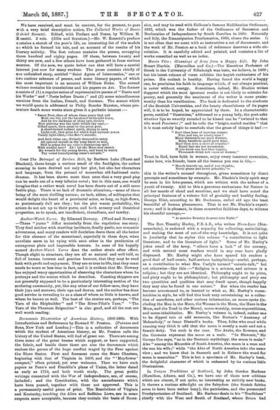Messis Vita Gleanings of Song from a Happy Life. By
John Stuart Blackie. (Macmillan and Co.)—The Emeritus Professor of Greek in the University of Edinburgh was born, we believe, in 1809; but his latest volume of verse exhibits the boyish enthusiasm of his prime. His outlook is healthy. Having found the world a happy one, he proclaims his faith in language which, if not always poetical, is never without energy. Sometimes, indeed, Mr. Blaokie writes doggerel which the most ignorant reader is not likely to mistake for poetry, and generally the sentiment of the writer is more prairie- worthy than his versification. The book is dedicated to the students of the Scottish Universities, and the hearty cheerfulness of its pages will, it is to be hoped, be appreciated by them. In a characteristic poem, entitled "Pessimism," addressed to a young lady, the pout asks whether lips so sweetly rounded to be kissed can be " twisted to that vile word Pessimist ;" and he tells the "bright-soiled maiden" that it is meat unholy logic to conclude that the genes of things is bad " Host thou hear of starving sinners Nine and ten, or ninety-nine ? Many thousands eat good dinners, Many hundreds quaff good wine. East thou seen a wore of cripples ? Equal legs are not unoommon. If you know one fool that tipples, Thousands drink not—man or woman."
Trust in God, have faith in woman, enjoy every innocent recreation, make love, win friends, learn all the lessons yea can in life,— "March bravely on, and if you stumble, Never groan and never grumble,"— this is the writer's counsel throughout, given sometimes by direct precepts and sometimes by example. Mr. Blackie's lively spirit may be seen in his love-poems, which are written with the ardour of a youth of twenty. Add to this a generous enthusiasm for Nature in all her moods of cloud and sunshine, and we shall have noted the principal features of a volume full of geniality and healthy feeling. George Eliot, according to Mr. Buchanan, called old age the least beautiful of human phenomena. That is not Mr. Blackie's experi- ence; and it is pleasant, in these somewhat faithless days, to witness his cheerful courage,- " As pensive Evening deepens into Right."














































 Previous page
Previous page